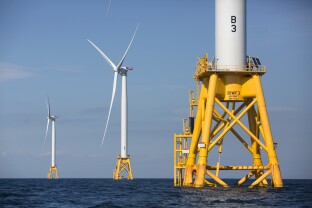Many clean energy developers were thrilled when Sens. Joe Manchin and John Barrasso finally released their plan for permitting reform — a crucial step toward actually enacting President Joe Biden’s ambitious climate policies. One problem: Traditional environmental groups hate the proposal.
The sharp disagreement in the climate community over the bill is just another incident in a widening rift over how to make the clean energy transition — one that echoes the divides between moderates and progressives within the Democratic Party.
Green groups like the Sierra Club and Earthjustice are finding themselves increasingly at odds with clean energy developers and more centrist policy wonks eager to shorten environmental reviews, lessen the threat of lawsuits and ultimately decrease the power of progressive climate activists.
